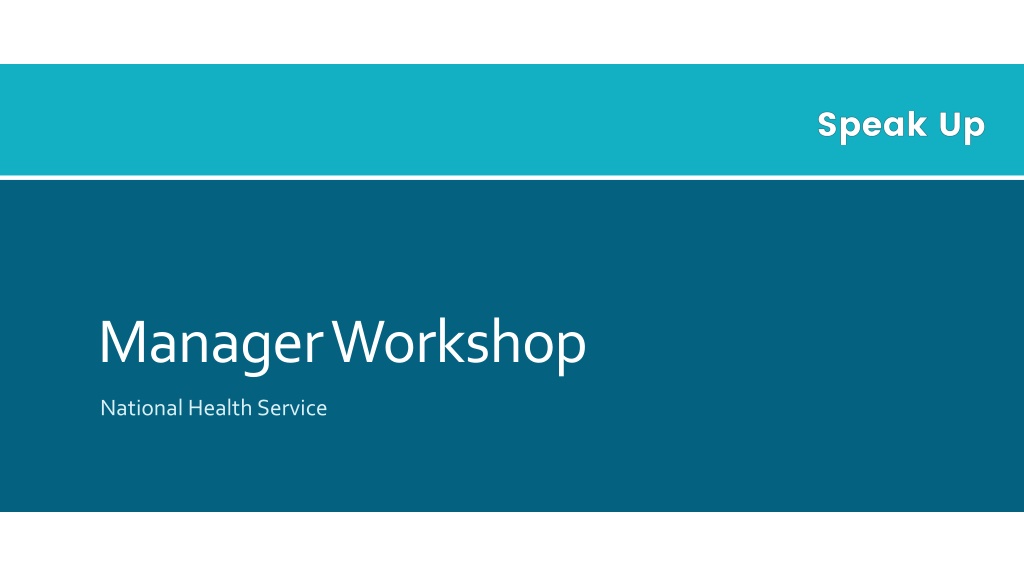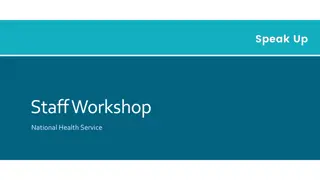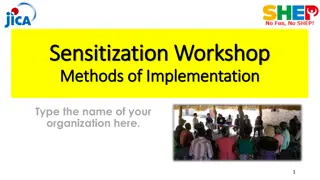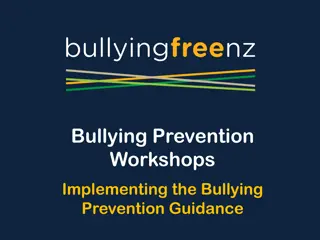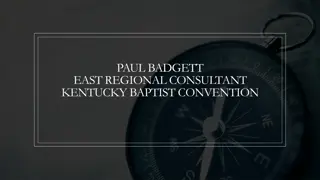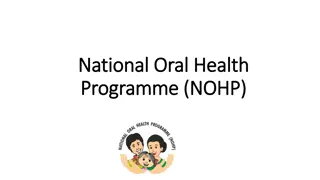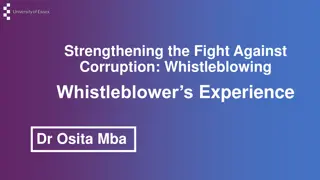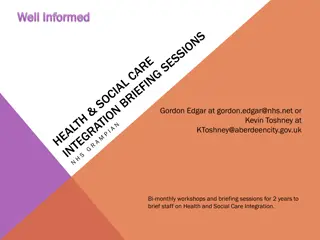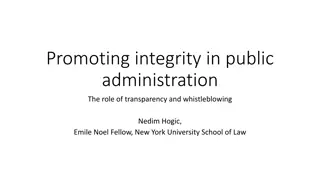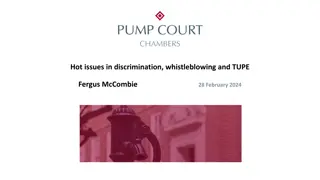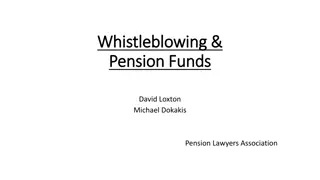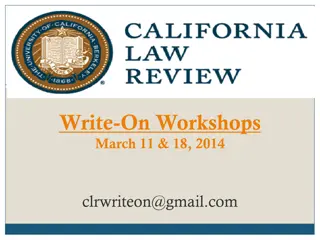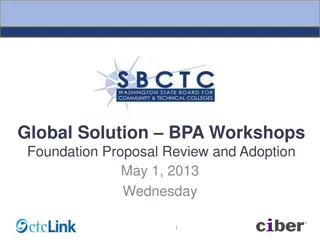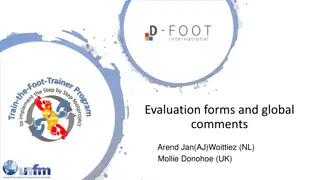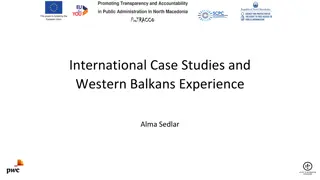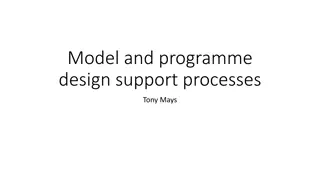Understanding Whistleblowing in National Health Service Workshops
Learn about whistleblowing in the context of the National Health Service (NHS) workshops, including the definition, legislation, historical background, high-profile cases, employee and employer duties, and where to seek help and support. Discover what qualifies for protection under whistleblowing laws and understand the challenges whistleblowers face.
Download Presentation

Please find below an Image/Link to download the presentation.
The content on the website is provided AS IS for your information and personal use only. It may not be sold, licensed, or shared on other websites without obtaining consent from the author. Download presentation by click this link. If you encounter any issues during the download, it is possible that the publisher has removed the file from their server.
E N D
Presentation Transcript
Manager Workshop National Health Service
Overview What is whistleblowing? Explore the law relating to whistleblowing The Whistleblowing process Employer and Employee Duties Know how to handle whistleblowing cases Know where to go for help and support 2 The Speak Up Helpline and Website are provided by Social Enterprise Direct Ltd on behalf of the Department of Health
Whistleblowing Definition of whistleblowing: The act of reporting a concern about a risk, danger or wrongdoing in an organisation Often called blowing the whistle or formally known as making a disclosure in the public interest 3 The Speak Up Helpline and Website are provided by Social Enterprise Direct Ltd on behalf of the Department of Health
Whistleblowing legislation arose out of a spate of scandals and disasters in the 1980s and early 1990s. Background Inquiries found that workers had been aware of the danger but too scared to raise the alarm or had done so in the wrong way. High profile examples included: Clapham Rail disaster an inspector didn t want to rock the boat Zeebrugge Ferry tragedy staff concerns ignored by management Collapse of Barings Bank an inquiry found nobody dared to speak up 4 The Speak Up Helpline and Website are provided by Social Enterprise Direct Ltd on behalf of the Department of Health
Media Cases There have been a number of high profile cases much more recently, including: Harold Shipman murders Mid Staffordshire NHS Foundation Trust 5 The Speak Up Helpline and Website are provided by Social Enterprise Direct Ltd on behalf of the Department of Health
Whistleblowing Do you have a whistleblowing policy? Do you know where to find it? What do you think it might feel like to be a whistleblower? Why is it hard to raise a concern? 6 The Speak Up Helpline and Website are provided by Social Enterprise Direct Ltd on behalf of the Department of Health
Protection What type of information will qualify for protection? A criminal offence The breach of a legal obligation A miscarriage of justice A danger to the health and safety of any individual Damage to the environment Deliberate attempt to conceal any of the above 1 The Speak Up Helpline and Website are provided by Social Enterprise Direct Ltd on behalf of the Department of Health
Raising a Concern To gain protection a worker who makes a disclosure must believe two things: That they are acting in the public interest (2013) That they reasonably believe the disclosure tends to show past, present or likely future wrongdoing. The information being disclosed must be of the right type- qualifying disclosure The concern must also be raised in the correct way 1 The Speak Up Helpline and Website are provided by Social Enterprise Direct Ltd on behalf of the Department of Health
Grievance vs Disclosure Grievance Protected Disclosure Tends to be a issue about employment rights. The person wishes to complain about their treatment. They have a personal interest in ensuring the issue is addressed. Tends to be about malpractice or serious wrongdoing such as dangerous or criminal activity which affect others. vs 9 The Speak Up Helpline and Website are provided by Social Enterprise Direct Ltd on behalf of the Department of Health
Protection What type of information will qualify for protection? A criminal offence The breach of a legal obligation A miscarriage of justice A danger to the health and safety of any individual Damage to the environment Deliberate attempt to conceal any of the above 10 The Speak Up Helpline and Website are provided by Social Enterprise Direct Ltd on behalf of the Department of Health
Types of Concern Physical or emotional abuse Bullying Theft, fraud or bribery Abuse of power, position or authority Failure to treat people with dignity Financial mismanagement Worker must disclose facts not just opinions 11 The Speak Up Helpline and Website are provided by Social Enterprise Direct Ltd on behalf of the Department of Health
The Right Way Keep a note of raising your concerns, perhaps by an email afterwards stating you are raising concerns in line with PIDA. Keep a record of dates of meetings and what was discussed If you do not get a satisfactory response, escalate your concern If nothing is being done internally, you can go to the regulator you should believe your information is substantially true (suspicion is not enough) Take advice if you consider wider disclosures such as the police or the media 12 The Speak Up Helpline and Website are provided by Social Enterprise Direct Ltd on behalf of the Department of Health
Who is Protected? Employees Agency workers People that are training with an employer, but not employed From 6 April 2015 the list was extended to include: Student nurses Student midwives 13 The Speak Up Helpline and Website are provided by Social Enterprise Direct Ltd on behalf of the Department of Health
Confidentiality Often issues can be raised in confidence but may be made public (eg during legal, disciplinary or police investigations). Organisations should make every effort to keep identity a secret. Organisations should be clear about their position on anonymous reporting. This can also be difficult to investigate. Whistleblowers should be careful with confidential patient information if reporting outside their team or organisation and should not breach their professional code of practice. 14 The Speak Up Helpline and Website are provided by Social Enterprise Direct Ltd on behalf of the Department of Health
Bullying & Harassment Bullying and Harassment Employers can also be liable for the acts of co-workers who victimise or harass whistleblowers (unless the employer can prove they have taken reasonable steps to prevent this) Discrimination March 2015 - The Secretary of State (NHS) will have the power to make regulations prohibiting discrimination against a job applicant by a prescribed NHS employer because it appears to the NHS employer that the applicant has a made a protected disclosure. 15 The Speak Up Helpline and Website are provided by Social Enterprise Direct Ltd on behalf of the Department of Health
Employee Duties PIDA does not obligate employees to raise concerns, however health and social care professionals will have a duty under their professional body NHS Constitution (Section 4b: Staff your responsibilities) Employee Terms and Conditions of Service (Section 21) The Statutory Duty of Candour The Government has introduced an explicit Duty of Candour as a CQC registration requirement placed on organisations. No candour-related offences on individuals-strengthened codes Safeguarding Policies 16 The Speak Up Helpline and Website are provided by Social Enterprise Direct Ltd on behalf of the Department of Health
Employers duty to investigate and feedback Employers Duties Whilst there is no legal duty to investigate it is generally accepted that employers should have a whistleblowing policy and part of this policy should include the duty to investigate and feedback to the person who has raised the concern. Terms and Conditions of Service (Section 21: NHS organisations must have local policies) The NHS Constitution (Section 4a: Staff your rights and NHS pledges to you) The Statutory Duty of Candour notification and further investigation where required 17 The Speak Up Helpline and Website are provided by Social Enterprise Direct Ltd on behalf of the Department of Health
A Managers Role Listen carefully and respect the worker s belief- managers must keep an open mind it doesn t mean they are bad managers if they weren t aware of the issue Respond and reassure Respect confidentiality but explain limitations Offer support (TU s occ health) Assess the facts Decide the way forward 18 The Speak Up Helpline and Website are provided by Social Enterprise Direct Ltd on behalf of the Department of Health
A Managers Role Follow the whistleblowing policy Maintain good communication with the worker Act fairly Seek advice and support Keep clear records Follow up action Ensure there is a positive outcome 19 The Speak Up Helpline and Website are provided by Social Enterprise Direct Ltd on behalf of the Department of Health
Advice & Support Telephone and email advice, signposting, support and guidance for the Health and Social Care Sector. Website tools, documents, guidance, updates: www.speakup.direct Raising Awareness networking, campaigns, events Other useful links: PCaW charity Trade Unions Professional Bodies e.g. Nursing & Midwifery Council ACAS employment advice Regulators e.g CQC, Ofsted, FSA etc www.gov.uk/whistleblowing 20 The Speak Up Helpline and Website are provided by Social Enterprise Direct Ltd on behalf of the Department of Health
Further Information www.hee.nhs.uk/our-work/hospitals-primary-community- care/learning-be-safer/raising-responding-concerns- whistleblowing www.speakup.direct 21 The Speak Up Helpline and Website are provided by Social Enterprise Direct Ltd on behalf of the Department of Health
